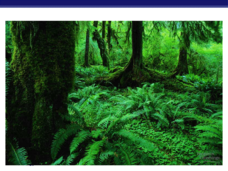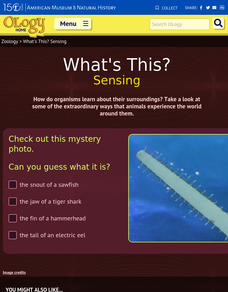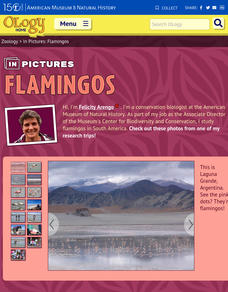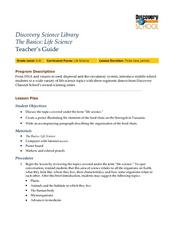Curated OER
Comparing and Contrasting a Desert Reptile and a Rainforest Mammal
First graders compare and contrast two different type of animals while also making predictions, observations, and asking provocative questioning. In this compare and contrast activity, 1st graders acquire knowledge about why some animals...
Curated OER
Insect Conservation
Students make a diorama. In this insect lesson plan, students review what they know and what they need to know about insects. Students define conservation, discuss why it is important to conserve insects, and make an insect diorama.
Curated OER
Survival of the Fastest: Predator and Prey in the African Savannah
Students explore the predator-prey relationship using an interactive game. In this biology lesson, students compare their physical attributes. They explain how predators develop to make it stronger and efficient as hunters. Each group...
Curated OER
Squid Dissection
First graders participate in dissecting a squid. They identify and locate specific parts of a squid with teacher guidance. They draw a picture of what their squid looked like and label specific parts.
Curated OER
Fayettewood Squares
If used as a center activity, this short presentation could be a motivating way for learners to review material relating to plants, the circulatory system, and more. However, there are only nine questions. It would be more useful if...
Curated OER
Conditioning and Storing Cut Flowers and Greens
Flower storage is an important topic if you are working with flowers. Consequently, this series of slides will be useful for those who are studying floral arranging. The information provided in this presentation could be used to enhance...
Cornell University
Glued into Science—Classifying Polymers
Explore the unique characteristics of polymers. A complete lesson begins with a presentation introducing polymers. Following the presentation, young scientists develop a laboratory plan for creating substances using polymers. They test...
Kenan Fellows
Unit 2: DNA Analysis
Ever wonder how they solve those mysterious murders in TV crime dramas? The second of four units in a Biotechnology series introduces scholars to the many methods of DNA analysis. Pupils create and run their own gel electrophoresis...
Curated OER
Photosynthesis: Life from Light and Air
All aspects of the photosynthesis process, and the way that plants have adapted with specializations are detailed here. The diagrams and info-graphics will be useful to your AP biology class. It could also be used as a review covering...
NOAA
What's the Difference?
Due to the isolation of seamounts, their biodiversity offers a great deal of information on the development of biological and physical processes. Pupils use simple cluster analysis to rate the similarity and differences in biological...
Curated OER
Lipids: Fats and Oils
A fantastic presentation with great images should improve student understanding of lipids and their involvement in the body. The chemistry of different fats, phospholipids, and steroids are explained. Additionally, the specific uses,...
Curated OER
Lipids: Fats and Oils
A fantastic presentation with great images should improve student understanding of lipids and their involvement in the body. The chemistry of different fats, phospholipids, and steroids are explained. Additionally, the specific uses,...
National Institute of Open Schooling
Nomenclature and General Principles
Carbon, the base for all organic compounds, exists in nature in its purest form as graphite or diamonds. The 25th lesson in a series of 36 teaches pupils the nomenclature of organic compounds. Learners read about how to use the IUPAC...
Tidewater Community College
Assignment: The “Big Mac” Index
Young economists learn about the method of predicting changes in the exchange rate with Big Macs in an instructional video. After an understanding the index, learners write a post on a discussion board and respond to class members' posts...
NOAA
The Incredible Carbon Journey: Play the Carbon Journey Game
Class members explore the carbon cycle in the final installment of the 10-part Discover Your Changing World series. They play a simulation game where they walk through the steps carbon takes as it cycles through the different layers of...
American Museum of Natural History
What's This? Sensing
There is a scallop that relies on sight so much that it actually has more than 100 eyes! There are many species that rely heavily on one sense or another. An online interactive resource has youth read about several of these animals. The...
American Museum of Natural History
In Pictures: Flamingo
Fifteen photos take scholars on a journey to Laguna Grande, Argentina to observe how a group of scientists work with native flamingos. Stunning images showoff the flamingo, its environment, scientists in the wild, and the impact the...
Curated OER
The Basics: Life Science
Students develop an understanding of the different fields of study that are encompassed by the term, life science. They view and discuss a video on the topic. In small groups they focus on on of the examples shown in the video to create...
Curated OER
Energy Flow in Ecosystems
Middle schoolers, in groups, create a slide show about the ecosystem and answer critical thinking questions based on their research.
Curated OER
Ecosystems - Lessons 1 and 3
For this biology worksheet, students answer 22 multiple choice questions on ecosystem. They identify which ecosystem component is described in each of the question.
Curated OER
Supermarkets, Sustenance and Sustainability
Students investigate jungles and the people who depend upon them. In this sustainability lesson, students research wild life conservation and discover the importance of a jungle to Amazonian people. Students create a group presentation...
Curated OER
Pond Ecosystem Field Trip
Learners investigate the environment by participating in a class trip. In this pond ecosystem lesson, students define a list of vocabulary terms associated with ponds such as invertebrate and metamorphosis. Learners attend a field trip...
Curated OER
Exploring Ecosystems
Fourth graders create an ecosystem as a class. They have already produced smaller ones. They use a pond or something similar on school grounds to meet the needs of certain plants and animals of their ecosystem. Specifically created will...
Curated OER
Home Sweet Home
Students examine the animals that live in trees. They identify their sounds, footprints and droppings. They draw pictures of the animals as well.
Other popular searches
- Deciduous Forest Food Chains
- Food Chains in Biomes
- Food Chains Food Webs
- Food Chains and Webs
- Food Chains Decomposers
- Food Chains and Food Webs
- Animal Food Chains
- Ocean Food Chains
- Meadow Food Chains
- Food Chains, Food Webs
- Guided Discovery Food Chains
- Food Chains Webs

























